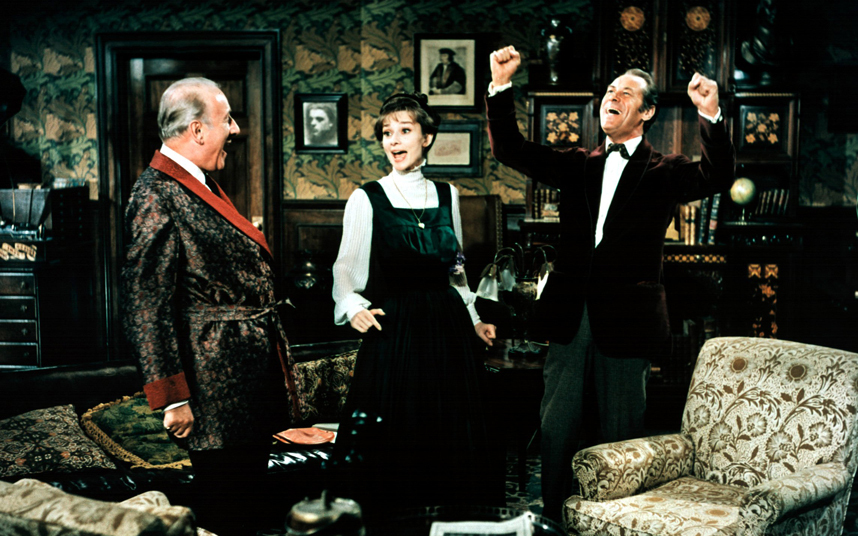Based on George Bernard Shaw’s stage play, ‘Pygmalion’, My Fair Lady is a musical drama film which is solely focused on the eagerness of improving a poor flower seller’s English accent to make herself presentable among the elites. Portraying the English lifestyle, British actors Audrey Hepburn and Rex Harrison represented their culture on screen. Today, we bring you our review on My Fair Lady.
My Fair Lady Review
Plot
Professor Higgins meets Eliza
Professor Henry Higgins is a phonetic expert who believes a man’s personality flourishes when they speak in a strong acceptable English accent. While Higgins strolls around the vegetable and fruit market of Covent Garden, he bumps into Colonel Hugh Pickering, who is also an expert in phonetics.
In a conversation, Higgins says that he can teach Eliza Doolittle, a young flower seller who has a strong ‘Cockney’ accent. Eliza has ambition for working in a flower shop so that she can communicate better with the customers. Higgins plans to transform Eliza to pass her off as a Duchess in the embassy hall. To follow her ambition, Eliza shows up at Higgin’s place. Pickering takes the responsibility of Eliza if Higgins can succeed.
Luck Changes Everything
Eliza’s father, Alfred Doolittle, who is a dustman by profession, gets worried about his daughter not coming home for three days. When he learns about Eliza staying with Higgins, Alfred gets furious to bring Eliza back for the sake of society.

By other means, Alfred actually hoped for getting some financial help from Higgins. Alfred was successful in managing quintuple pounds from Higgins. Being impressed with Aflred’s natural love for language and quench for learning morality, Higgins recommended Alfred to a wealthy American family for educating on moral lessons.
Eliza Gets The Accent
Eliza wanted a change in the teaching process of Higgins. The tactics were not working much which led Higgins’ servants to feel annoyed at Eliza and feel pity for Higgins.
Right when Eliza, Higgins and Pickering were about to give up on her, Eliza magically picks up the accent and Higgins finally gets his success.
Success, Drama and Endgame
Eliza keeps succeeding in her life with the improvised accent. Soon, she manages to catch the Hungarian Prince’s attention and many more influential people.

In the meanwhile, Higgins takes all the credits for Eliza and leaves her unnoticed. Eliza rages on Higgins for not crediting her. Eliza’s father Alfred inherited some ransom from the wealthy American he was working for. In this way, Eliza also becomes wealthy due to her father’s inheritance. Later, Alfred later remarries and Eliza receives a stepmother.
Higgins comes back to Eliza for closure. She primarily refuses to keep any contact with Higgins. Later, when Higgins realizes that Eliza has become an important part of his life, he hopes for the pair’s reconciliation. Eventually, Eliza and Higgins reunite.
Musical Numbers
The movie has 25 musical plays and 12 soundtracks. Audrey Hepbun sang in 9 of those plays and Rex Harrison sang 7 plays.
Musical play of the movie was done by Alan Jay Lerner and Frederick Loewe. Mona Washbourne, Jeremy Brett, Wilfrid Hyde-White and many more composers and actors composed the soundtrack of the movie. Each actor who was casted in the movie had to sing. Later, those songs were dubbed by other singers who had similar voices.
Most of the actors including Audrey Hepburn didn’t really have a singing voice. Despite singing in the movie, her voice was dubbed by Marni Nixon.
Cast and Director
Audrey Hepburn played the role of young flower seller Eliza Doolittle. To adapt the Cockney accent, Audrey had to practice several times. Speaking of Audrey Hepburn, check out our Breakfast at Tiffany’s review!
Rex Harrison was the sophisticated phonetic expert, Henry Higgins. Ethnically being British was quite easy for him to play the role with perfect vocabulary.
Stanley Holloway was Alfred Doolittle, a dustman turned wealthy due to Higgins’s recommendation.

There were several uncredited artists who worked in this film. The movie was directed by George Cukor. Alan Jay Lerner wrote the screenplay of the movie. My Fair Lady was released under the Warner Bros banner.
Review
My Fair Lady was the highest grossing film of Hollywood at that time. With a budget of 17$ million dollars, the movie was re-released three times. The movie was definitely worth the budget of 17$ million.
In the beginning of the movie, Rex Harrison’s enchanting accent will keep you hooked to the movie. If someone loves hearing a British accent, Rex’s accent will make you watch the movie for sure.
One may love Higgins at first, the feelings will change when you will see Higgins doing injustice to Eliza. Henry Higgins’s callous behavior will create a different feeling for him.
We all know that Audrey Hepburn is naturally very good looking. She barely ever played a role where she was left unpraised. Young Hepburn looked effortlessly sweet in portraying Eliza Doolittle. Even her cockney accent will sound like music to the ears.
Audrey being a socialite was a whole different personality of hers. When Eliza danced in the Embassy hall with the Hungarian Prince, no one could ever tell she was a former flower girl.
Awards and Recognition
My Fair Lady was nominated in 15 awards including Academy Awards, Golden Globe and British Academy awards.
The movie got nominations in 12 categories in Academy Awards. Among the 12 categories, the movie could bag 8 awards including Best Picture, Best Movie and Best Director.
In British Academy Film Awards, My Fair Lady was nominated in two categories. Unsurprisingly, the award of Best Film was bagged by the director George Cukor.
The movie had 5 nominations in Golden Globe awards. Three categories where the movie won awards are Best Motion Picture, Best Director and Best Actor in motion films.
We hope you thoroughly enjoyed reading our review on My Fair Lady. For more reviews on classic movies, do check our dedicated section!

